 |

|
Youth in Revolt |
|
Michael Cera turns his well
developed awkward adolescent character on its head in this wonderful adaptation
of the novel by C.D. Payne.
Cera plays Nick Twisp, a teen that finds he must
create an alter ego to woo a girl he's fallen for. Given her love of all things
Belmondo, Twisp uses Francois to be the devil-on-his-shoulder, allowing him to
act as the bad boy he's never been.
It all sounds like it could be trite and
predictable, yet Cera plays both roles with such effortlessness and elegance
that it's hard not to fall for the story. This is a Cera breakout role, showing
better than most films his genuine range as an actor. Commenting directly upon
his stereotypical roles, we see the real power of his capabilities as an actor,
as he seamlessly occupies both characters with great with and charm.
Excellent supporting performances from the likes
of Jean Smart, Steve Buscemi, and even Ray Liotta make for an extremely
enjoyable coming of age film with a Twispy twist. |
|
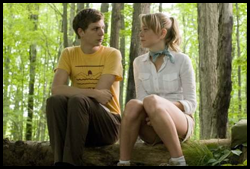 |
|
Directed by: Miguel
Arteta
Grade:
A- |
|
|
Life During
Wartime |
|
It seems, well, creepy
that Todd Solondz has crafted an accessible, almost mainstream film. Sure, the
familiar themes of his latest works still abound - paedophilia, and other forms
of dysfunctional relationships are once again covered - but this film seems to
have a lightness that Happiness and especially Palindromes
lacked. This is probably as close as he's going to get to a multiplex-ready
film any time soon.
Tying disparate stories together, mostly told
through casual conversation, the film avoids feeling episodic. Through the
witty dialogue we get some genuinely amusing insights into the characters, from
a daughter's Karaoke recital to the desperately depressingly sister named "Joy"
(played with mousey perfection by Shirley Henderson). And kudos to Paul Reubens
for his scene stealing phantasmagoric creepiness.
This is a talky piece, sure, and scenes mirror
almost exactly those found in Happiness, making this a kindred film, if
not a direct sequel. As such, it's not nearly as hard hitting as the previous
film, and as such isn't nearly as successful. Still, it's a pleasure to watch,
yet is perhaps too weird for a casual filmgoer, too slight for the hardcore
fans of Solondz. |
|
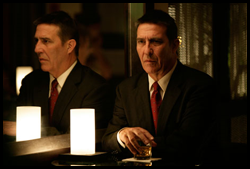 |
|
Directed by: Todd
Solondz
Grade:
B+ |
|
|
The Most Dangerous Man in
America: Daniel Ellsberg and the Pentagon Papers |
|
Comprised of talking head
interviews, news reports, and (somewhat clumsy) "recreations" of key events
(Oooh, photocopying!) the film exposes Ellsberg rise as one of the most famous
American whistleblowers of all time.
Broadening its scope from simply a
biography of Ellsber's remarkable journey, the central thesis is that it was
the release of the Pentagon papers that set in motion the events that
culminated in the Watergate break-in, and thus, in turn, ended the war with the
ousting of Nixon. While this claim may overly simplify the history, there's
still enough insight, often with remarkably forthright comments from the
participants, that make for a interesting watch.
Pale beside such
luminous, groundbreaking docs as "Fog of War" or even the latest Frontline
production, there's still much to be enlightened by. |
|
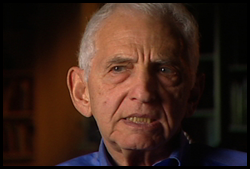 |
|
Directed by: Judith
Ehrlich & Rick Goldsmith
Grade:
B- |
|
|
My Son, My Son, What Have
Ye Done? |
|
A weird mess of a film,
Herzog has taken a procedural crime drama and turned it on its head.
Minutes into the film we find out that a murder
has occurred. We know who did it, where they are hiding. The rest of the film
is spent either in surreal flashback to ancient Greek theatrical presentations,
or the exploration of Flamingo kitch. Couple this with moments of stillness
(the shot to the right is an example of one of these "freeze frames", with the
actors simply stopping in place without specific motivation) and you get the
idea of this strange, surreal flick.
Herzog was quite adamant that while David Lynch
is associated as a producer, he played no role in the film. Instead, his
intention was to write, shoot, and cut a film in a very short amount of time,
with a very small budget, using a coterie of his famous friends as actors.
Unlike most recent Lynch films, there was a lightness and humour to the entire
proceeding. Unfortunately, there was also the blindly incoherent moments,
gratuitous side trips into surrealism for little to no narrative reason. Herzog
dismissed all claims of this incoherence, meaning that, unfortunately, he's
blind to his own weaknesses with this film.
That said, it's still, at its heart, and
enjoyable picture, quirky and crazy enough to be captivating in its own
lurching way. After all, who else but Herzog would find compelling beauty in a
basketball left in a tree by a highway. For that, I guess, we should continue
be eternally grateful. |
|
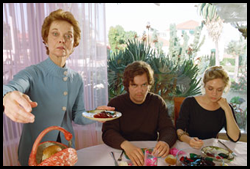 |
|
Directed by:Werner
Herzog
Grade:
B- |
|
|
Solomon Kane |
|
Just as Black Hole or
the original Battlestar Galactica series saw the light of day after the
success of Star Wars, this clearly derivative, post-Lord of the
Rings meets Pirates of the Caribbean sword flick is told with so
much earnestness that it all appears a bit silly.
Drawn from the pages
of the comic book, Kane cuts and slashes his way through numerous baddies, as
the incessant "clink/clink" masks the fact that the story is pretty darned
boring. There's little in the way of novelty after a while, and when a Balrog
clone shows up for good measure, it's all finished neatly (and clearly within
the allotted CGI budget).
Lacking much humour or spirit, this both
missed the epic nature of LOTR and the genuine zeal of most swordplay
flicks, from POTC to Princess Bride to Captain Blood. This
somber, drenched-in-rain misery piece simply doesn't ever come together, and
even as a MM distraction it disappoints. |
|
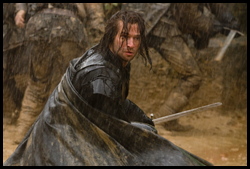 |
|
Directed by: Michael J.
Bassett
Grade:
C- |
|
|
 |
|
